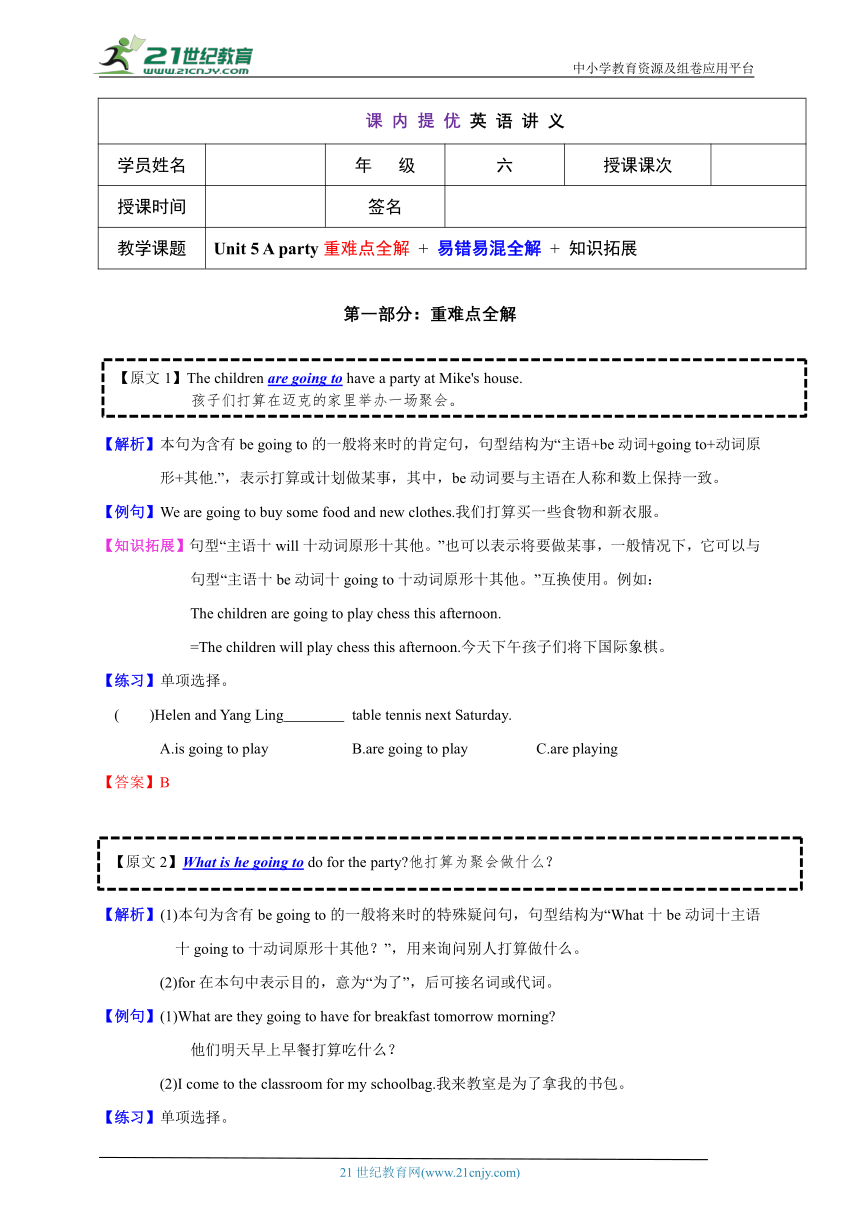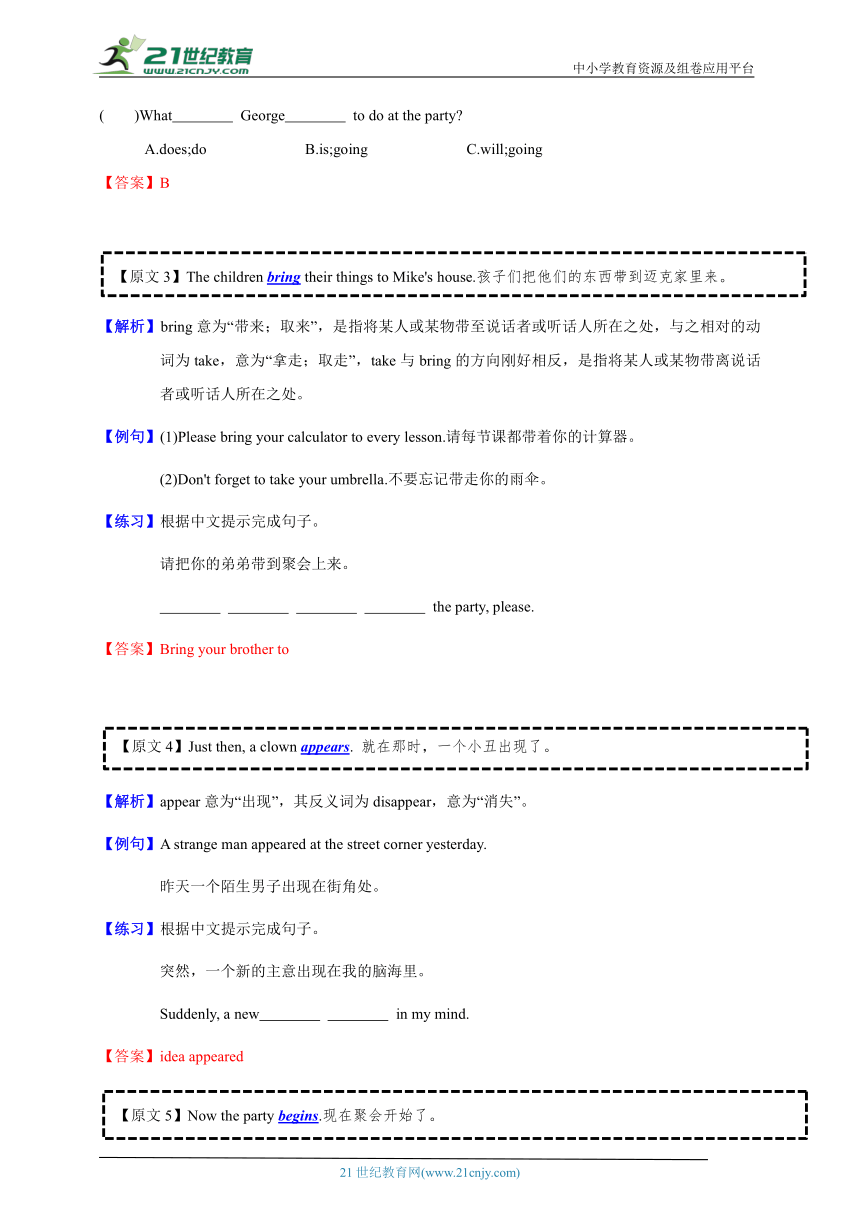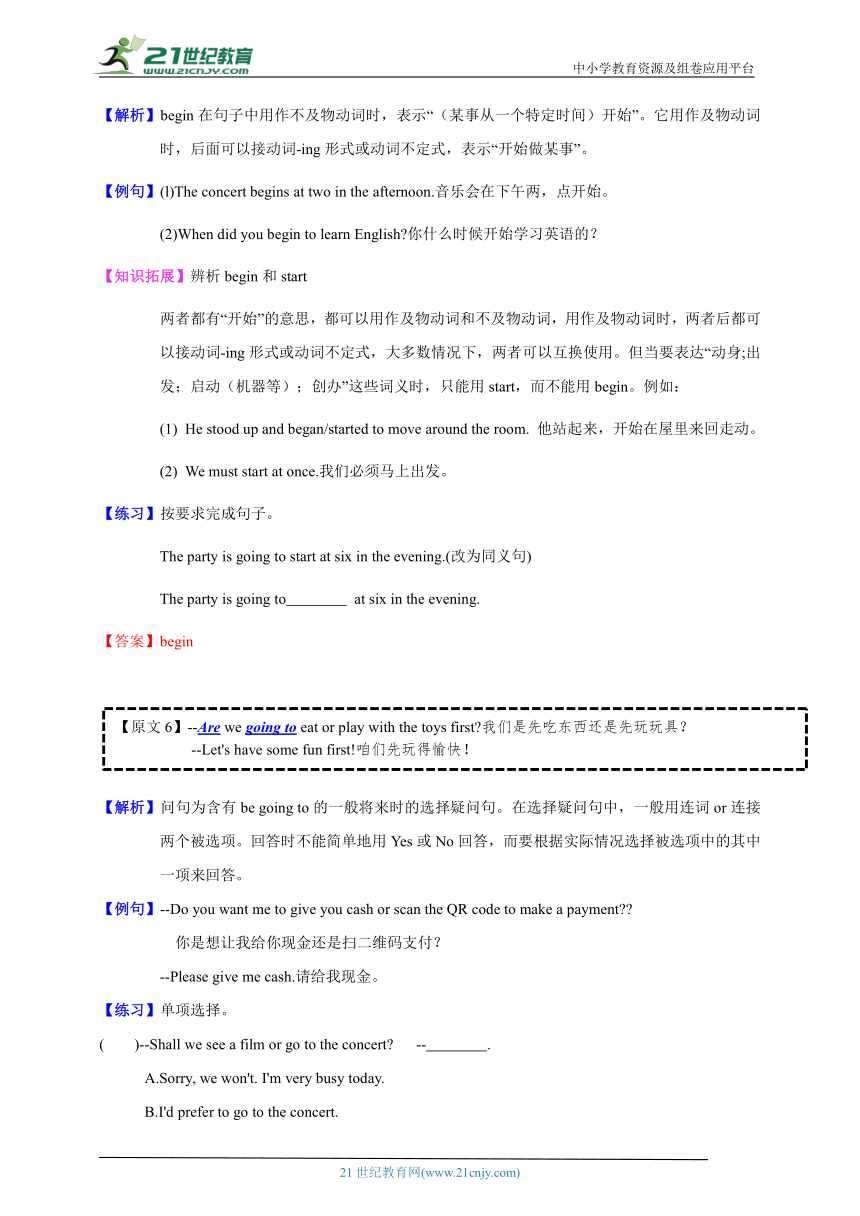Unit 5 A party课内提优讲义
文档属性
| 名称 | Unit 5 A party课内提优讲义 |

|
|
| 格式 | doc | ||
| 文件大小 | 1.2MB | ||
| 资源类型 | 试卷 | ||
| 版本资源 | 牛津译林版 | ||
| 科目 | 英语 | ||
| 更新时间 | 2023-02-16 17:04:45 | ||
图片预览



文档简介
中小学教育资源及组卷应用平台
课 内 提 优 英 语 讲 义
学员姓名 年 级 六 授课课次
授课时间 签名
教学课题 Unit 5 A party重难点全解 + 易错易混全解 + 知识拓展
第一部分:重难点全解
【解析】本句为含有be going to的一般将来时的肯定句,句型结构为“主语+be动词+going to+动词原形+其他.”,表示打算或计划做某事,其中,be动词要与主语在人称和数上保持一致。
【例句】We are going to buy some food and new clothes.我们打算买一些食物和新衣服。
【知识拓展】句型“主语十will十动词原形十其他。”也可以表示将要做某事,一般情况下,它可以与句型“主语十be动词十going to十动词原形十其他。”互换使用。例如:
The children are going to play chess this afternoon.
=The children will play chess this afternoon.今天下午孩子们将下国际象棋。
【练习】单项选择。
( )Helen and Yang Ling table tennis next Saturday.
A.is going to play B.are going to play C.are playing
【答案】B
【解析】(1)本句为含有be going to的一般将来时的特殊疑问句,句型结构为“What十be动词十主语十going to十动词原形十其他?”,用来询问别人打算做什么。
(2)for在本句中表示目的,意为“为了”,后可接名词或代词。
【例句】(1)What are they going to have for breakfast tomorrow morning
他们明天早上早餐打算吃什么?
(2)I come to the classroom for my schoolbag.我来教室是为了拿我的书包。
【练习】单项选择。
( )What George to do at the party
A.does;do B.is;going C.will;going
【答案】B
【解析】bring意为“带来;取来”,是指将某人或某物带至说话者或听话人所在之处,与之相对的动词为take,意为“拿走;取走”,take与bring的方向刚好相反,是指将某人或某物带离说话者或听话人所在之处。
【例句】(1)Please bring your calculator to every lesson.请每节课都带着你的计算器。
(2)Don't forget to take your umbrella.不要忘记带走你的雨伞。
【练习】根据中文提示完成句子。
请把你的弟弟带到聚会上来。
the party, please.
【答案】Bring your brother to
【解析】appear意为“出现”,其反义词为disappear,意为“消失”。
【例句】A strange man appeared at the street corner yesterday.
昨天一个陌生男子出现在街角处。
【练习】根据中文提示完成句子。
突然,一个新的主意出现在我的脑海里。
Suddenly, a new in my mind.
【答案】idea appeared
【解析】begin在句子中用作不及物动词时,表示“(某事从一个特定时间)开始”。它用作及物动词时,后面可以接动词-ing形式或动词不定式,表示“开始做某事”。
【例句】(l)The concert begins at two in the afternoon.音乐会在下午两,点开始。
(2)When did you begin to learn English 你什么时候开始学习英语的?
【知识拓展】辨析begin和start
两者都有“开始”的意思,都可以用作及物动词和不及物动词,用作及物动词时,两者后都可以接动词-ing形式或动词不定式,大多数情况下,两者可以互换使用。但当要表达“动身;出发;启动(机器等);创办”这些词义时,只能用start,而不能用begin。例如:
He stood up and began/started to move around the room. 他站起来,开始在屋里来回走动。
We must start at once.我们必须马上出发。
【练习】按要求完成句子。
The party is going to start at six in the evening.(改为同义句)
The party is going to at six in the evening.
【答案】begin
【解析】问句为含有be going to的一般将来时的选择疑问句。在选择疑问句中,一般用连词or连接两个被选项。回答时不能简单地用Yes或No回答,而要根据实际情况选择被选项中的其中一项来回答。
【例句】--Do you want me to give you cash or scan the QR code to make a payment
你是想让我给你现金还是扫二维码支付?
--Please give me cash.请给我现金。
【练习】单项选择。
( )--Shall we see a film or go to the concert -- .
A.Sorry, we won't. I'm very busy today.
B.I'd prefer to go to the concert.
C.Good idea!Let's go.
【答案】B
【解析】本句为含有be going to的一般将来时的一般疑问句,句型结构为“Be动词十主语十going to十动词原形+其他?”,用来询问别人是否打算做某事。其肯定回答为“Yes,主语十be动词。”,否定回答为“No,主语十be动词十not.”。
【例句】--Are you going to visit your grandparents this weekend
你(们)这个周末打算去拜访你(们)的祖父母吗?
--Yes,I am/we are.是的,我(们)打算。
【练习】按要求完成句子。
Roy is going to put on a play at the class party.(改为一般疑问句)
Roy a play at the class party
【答案】Is, going to put on
【解析】本句中的put on译为“上演,表演”,它还可以表示“穿上”,此时后接衣服、鞋帽类名词(短语)作宾语。当put on表示“穿上”时,它的反义短语为take off,意为“脱下”。
【例句】(l)The drama club is putting on Romeo and Juliet..
剧社正在上演《罗密欧与朱丽叶》。
(2)Put on your sweater, or you'll have a cold.穿上你的毛衣,否则你会感冒的。
【练习】根据中文提示完成句子。
他们下个星期五将在这里上演一部新戏剧。
They will a new here next Friday.
【答案】put on, play
第二部分:易错易混全解
there be句型的一般将来时的用法
【例题】单项选择。
( )There a magic show in the school hall tomorrow.
A.is going to B.have C.is going to be
【答案】C
点拨:
there be句型的一般将来时表示将来某地会有某人或某物,含有be going to的there be句型的句型结构为“There is/are going to be...”。注意,该句型只表示人或物所处的地点,人或物与该地点之间并不存在所属关系,所以句型中不能使用have或has。故选C。
易混淆bring和take的用法
【例题】选词填空。
(1)John (brought/took) a book with him when he left.
(2)The east wind (brings/takes) a lot of rain here every year.
【答案】(l)took (2)brings
点拨:
bring是指将某人或某物带至说话者或听话人所在之处,而take与bring的方向刚好相反,是指将某人或某物带离说话者或听话人所在之处。第(1)小题,句意为“John离开时随身携带了一本书。”此处John是将书“带离”它原本的位置到别的地方去,故填took。第(2)小题,句意为“东风每年为这里带来许多雨水。”此处是指东风“带来”雨水,故填brings。
【原文1】The children are going to have a party at Mike's house.
孩子们打算在迈克的家里举办一场聚会。
【原文2】What is he going to do for the party 他打算为聚会做什么?
【原文3】The children bring their things to Mike's house.孩子们把他们的东西带到迈克家里来。
【原文4】Just then, a clown appears. 就在那时,一个小丑出现了。
【原文5】Now the party begins.现在聚会开始了。
【原文6】--Are we going to eat or play with the toys first 我们是先吃东西还是先玩玩具?
--Let's have some fun first!咱们先玩得愉快!
【原文7】Are you going to bring some snacks to the party 你(们)打算带一些零食到聚会上来吗?
【原文8】Let's put on a play.咱们表演一部戏剧吧。
HYPERLINK "http://21世纪教育网(www.21cnjy.com)
" 21世纪教育网(www.21cnjy.com)
课 内 提 优 英 语 讲 义
学员姓名 年 级 六 授课课次
授课时间 签名
教学课题 Unit 5 A party重难点全解 + 易错易混全解 + 知识拓展
第一部分:重难点全解
【解析】本句为含有be going to的一般将来时的肯定句,句型结构为“主语+be动词+going to+动词原形+其他.”,表示打算或计划做某事,其中,be动词要与主语在人称和数上保持一致。
【例句】We are going to buy some food and new clothes.我们打算买一些食物和新衣服。
【知识拓展】句型“主语十will十动词原形十其他。”也可以表示将要做某事,一般情况下,它可以与句型“主语十be动词十going to十动词原形十其他。”互换使用。例如:
The children are going to play chess this afternoon.
=The children will play chess this afternoon.今天下午孩子们将下国际象棋。
【练习】单项选择。
( )Helen and Yang Ling table tennis next Saturday.
A.is going to play B.are going to play C.are playing
【答案】B
【解析】(1)本句为含有be going to的一般将来时的特殊疑问句,句型结构为“What十be动词十主语十going to十动词原形十其他?”,用来询问别人打算做什么。
(2)for在本句中表示目的,意为“为了”,后可接名词或代词。
【例句】(1)What are they going to have for breakfast tomorrow morning
他们明天早上早餐打算吃什么?
(2)I come to the classroom for my schoolbag.我来教室是为了拿我的书包。
【练习】单项选择。
( )What George to do at the party
A.does;do B.is;going C.will;going
【答案】B
【解析】bring意为“带来;取来”,是指将某人或某物带至说话者或听话人所在之处,与之相对的动词为take,意为“拿走;取走”,take与bring的方向刚好相反,是指将某人或某物带离说话者或听话人所在之处。
【例句】(1)Please bring your calculator to every lesson.请每节课都带着你的计算器。
(2)Don't forget to take your umbrella.不要忘记带走你的雨伞。
【练习】根据中文提示完成句子。
请把你的弟弟带到聚会上来。
the party, please.
【答案】Bring your brother to
【解析】appear意为“出现”,其反义词为disappear,意为“消失”。
【例句】A strange man appeared at the street corner yesterday.
昨天一个陌生男子出现在街角处。
【练习】根据中文提示完成句子。
突然,一个新的主意出现在我的脑海里。
Suddenly, a new in my mind.
【答案】idea appeared
【解析】begin在句子中用作不及物动词时,表示“(某事从一个特定时间)开始”。它用作及物动词时,后面可以接动词-ing形式或动词不定式,表示“开始做某事”。
【例句】(l)The concert begins at two in the afternoon.音乐会在下午两,点开始。
(2)When did you begin to learn English 你什么时候开始学习英语的?
【知识拓展】辨析begin和start
两者都有“开始”的意思,都可以用作及物动词和不及物动词,用作及物动词时,两者后都可以接动词-ing形式或动词不定式,大多数情况下,两者可以互换使用。但当要表达“动身;出发;启动(机器等);创办”这些词义时,只能用start,而不能用begin。例如:
He stood up and began/started to move around the room. 他站起来,开始在屋里来回走动。
We must start at once.我们必须马上出发。
【练习】按要求完成句子。
The party is going to start at six in the evening.(改为同义句)
The party is going to at six in the evening.
【答案】begin
【解析】问句为含有be going to的一般将来时的选择疑问句。在选择疑问句中,一般用连词or连接两个被选项。回答时不能简单地用Yes或No回答,而要根据实际情况选择被选项中的其中一项来回答。
【例句】--Do you want me to give you cash or scan the QR code to make a payment
你是想让我给你现金还是扫二维码支付?
--Please give me cash.请给我现金。
【练习】单项选择。
( )--Shall we see a film or go to the concert -- .
A.Sorry, we won't. I'm very busy today.
B.I'd prefer to go to the concert.
C.Good idea!Let's go.
【答案】B
【解析】本句为含有be going to的一般将来时的一般疑问句,句型结构为“Be动词十主语十going to十动词原形+其他?”,用来询问别人是否打算做某事。其肯定回答为“Yes,主语十be动词。”,否定回答为“No,主语十be动词十not.”。
【例句】--Are you going to visit your grandparents this weekend
你(们)这个周末打算去拜访你(们)的祖父母吗?
--Yes,I am/we are.是的,我(们)打算。
【练习】按要求完成句子。
Roy is going to put on a play at the class party.(改为一般疑问句)
Roy a play at the class party
【答案】Is, going to put on
【解析】本句中的put on译为“上演,表演”,它还可以表示“穿上”,此时后接衣服、鞋帽类名词(短语)作宾语。当put on表示“穿上”时,它的反义短语为take off,意为“脱下”。
【例句】(l)The drama club is putting on Romeo and Juliet..
剧社正在上演《罗密欧与朱丽叶》。
(2)Put on your sweater, or you'll have a cold.穿上你的毛衣,否则你会感冒的。
【练习】根据中文提示完成句子。
他们下个星期五将在这里上演一部新戏剧。
They will a new here next Friday.
【答案】put on, play
第二部分:易错易混全解
there be句型的一般将来时的用法
【例题】单项选择。
( )There a magic show in the school hall tomorrow.
A.is going to B.have C.is going to be
【答案】C
点拨:
there be句型的一般将来时表示将来某地会有某人或某物,含有be going to的there be句型的句型结构为“There is/are going to be...”。注意,该句型只表示人或物所处的地点,人或物与该地点之间并不存在所属关系,所以句型中不能使用have或has。故选C。
易混淆bring和take的用法
【例题】选词填空。
(1)John (brought/took) a book with him when he left.
(2)The east wind (brings/takes) a lot of rain here every year.
【答案】(l)took (2)brings
点拨:
bring是指将某人或某物带至说话者或听话人所在之处,而take与bring的方向刚好相反,是指将某人或某物带离说话者或听话人所在之处。第(1)小题,句意为“John离开时随身携带了一本书。”此处John是将书“带离”它原本的位置到别的地方去,故填took。第(2)小题,句意为“东风每年为这里带来许多雨水。”此处是指东风“带来”雨水,故填brings。
【原文1】The children are going to have a party at Mike's house.
孩子们打算在迈克的家里举办一场聚会。
【原文2】What is he going to do for the party 他打算为聚会做什么?
【原文3】The children bring their things to Mike's house.孩子们把他们的东西带到迈克家里来。
【原文4】Just then, a clown appears. 就在那时,一个小丑出现了。
【原文5】Now the party begins.现在聚会开始了。
【原文6】--Are we going to eat or play with the toys first 我们是先吃东西还是先玩玩具?
--Let's have some fun first!咱们先玩得愉快!
【原文7】Are you going to bring some snacks to the party 你(们)打算带一些零食到聚会上来吗?
【原文8】Let's put on a play.咱们表演一部戏剧吧。
HYPERLINK "http://21世纪教育网(www.21cnjy.com)
" 21世纪教育网(www.21cnjy.com)
